 W
WAjamila is the main character of a story in canto 6 of the Bhagavata Purana. In Hinduism, the story of Ajamila is used to illustrate that by uttering God’s divine name, there is hope for even the sinful to be redeemed from their propensity to commit sins.
 W
WAniruddha or Aniruddh, meaning "unrestrained", "without obstacles" or "unstoppable" was the son of Pradyumna and Rukmavati and the grandson of Krishna and Rukmini. He is said to have been very much like his grandfather, to the extent that he may be a jana avatar, the avatar of Vishnu. The four are considered to be Vishnu-tattva or Vishnu's plenary expansions. It has been also used as one of the names of Lord Shiva.
 W
WArchi was an ideal queen and an avatar of Lakshmi in Hindu mythology. According to Bhagavata Purana, Archi is emerged from Vena's body, along with her husband, maharaja Prithu and considered as an avatar of the wealth goddess Lakshmi, the wife of Vishnu.
 W
WArjuna is the main protagonist of the Indian epic Mahabharata and also appears in other ancient Hindu texts. In the epic, he is the third among Pandavas, the five sons of Pandu. He was born when Indra, god of rain, blessed Kunti and Pandu with a son. The family formed part of the royal line of the Kuru Kingdom.
 W
WAshtabharya(s) or Ashta-bharya(s) is the group of eight principal queen-consorts of Hindu god Krishna, an avatar of the god Vishnu and the king of Dwarka - in the Dvapara Yuga (epoch). The most popular list, found in the Bhagavata Purana, includes: Rukmini, Satyabhama, Jambavati, Kalindi, Mitravinda, Nagnajiti, Bhadra and Lakshmana. Variations exist in the Vishnu Purana and the Harivamsa, which includes queens called Madri or Rohini, instead of Bhadra. Most of them are princesses.
 W
WBalarama is a Hindu god and the elder brother of Krishna. He is particularly significant in the Jagannath tradition, as one of the triad deities. He is also known as Baladeva, Balabhadra, Haladhara, Halayudha, and Sankarshana. The first two epithets refer to his strength, the last two associate him with Hala from his strong associations with farming and farmers, as the deity who used farm equipment as weapons when needed.
 W
WBana is described as an ancient king of Sonitpura in several Hindu Puranic scriptures. Bana was a thousand-armed Asura king, and the son of Mahabali.
 W
WBhadra is one of the Ashtabharya, the eight principal queen-consorts of Hindu god Krishna, according to the scripture Bhagavata Purana. She is named in the Bhagavat Purana as being the eighth wife of Krishna, and identified as being his cross(not parallel) cousin. Some sources state that Bhadra is the seventh wife of Krishna. The Vishnu Purana and the Harivamsa do not name Bhadra at all in the list of the Ashtabharya, but refer to her as 'the daughter of Dhrishtaketu' or 'the princess of Kekeya'.
 W
WChitralekha (चित्रलेखा) was a friend of Usha and daughter of minister of Banasura who ruled the present-day central Assam with his capital at Sonitpur.
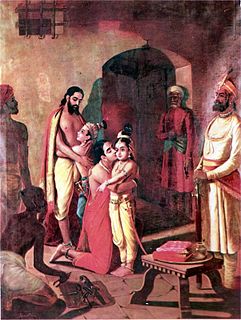 W
WIn Hinduism, Devaki (देवकी) is one of the daughters of Devak. She married Vasudeva and mothered Krishna as specified in the ancient Mahabharata
 W
WThe Kumaras are four sages (rishis) who roam the universe as children from the Puranic texts of Hinduism, generally named Sanaka, Sanatana, Sanandana, and Sanatkumara. They are described as the first mind-born creations and sons of the creator-god Brahma. Born from Brahma's mind, the four Kumaras undertook lifelong vows of celibacy (brahmacharya) against the wishes of their father. They are said to wander throughout the materialistic and spiritualistic universe without any desire but with purpose to teach. All four brothers studied Vedas from their childhood, and always travelled together.
 W
WHiranyakashipu was an Asura and king of the daityas from the Puranic scriptures of Hinduism. His name literally translates to "clothed in gold", and is often interpreted as depicting one who is fond of wealth. In the Puranas, however, it is also stated the name was derived from a golden throne called 'Hiranyakashipu' the asura sat in or nearby during the Atiratra (Soma) sacrifice.
 W
WHiranyaksha, also known as Hiranyanetra was an oppressive Asura who attacked the heavens and thereafter kidnapped and attempted to destroy the earth goddess in Hindu mythology.
 W
WJambavana also known as Jambavanta is a character originating in Ramayan. The King of Bears, he is an Asian black bear or sloth bear in Indian epic tradition, immortal to all but his father Brahma. Several times he is mentioned as Kapishreshtha and other epithets generally given to the Vanaras. He is known as Riksharaj. Rikshas are earlier described as similar to Vanaras but in later versions of Ramayana Rikshas are described as bears. He was created by Brahma, to assist Rama in his struggle against Ravana.
 W
WJambavanti is second of the Ashtabharya, the eight principal queen-consorts of Hindu god Krishna, the king of Dwarka – in the Dvapara Yuga (epoch).She was the only daughter of the bear-king Jambavan. Krishna married her, when he defeated Jambavan to retrieve the stolen Syamantaka jewel.
 W
WIn Hindu mythology, Jaya and Vijaya are the two gatekeepers (Dwarapalaka) of the abode of Vishnu, known as Vaikuntha. Due to a curse, they were forced to undergo multiple births as mortals who would be subsequently killed by various avatars of Vishnu. They were incarnated as Hiranyakashipu and Hiranyaksha in Satya Yuga, Ravana and Kumbhakarna in Treta Yuga, and finally Shishupala and Dantavakra in Dvapara Yuga.
 W
WBesides eight principal queens (Ashtabharya), the Hindu god Krishna, an avatar of the god Vishnu and the king of Dwarka, is described to have many unnamed junior wives. Their number is mentioned as 16,000 or 16,100 in different scriptures.
 W
WKālayavana was a king who invaded Mathurā with an army of three million yavanas against Sri Krishna.
 W
WIn Hindu tradition, Kamsa was the tyrant ruler of the Vrishni kingdom with its capital at Mathura. He was the cousin of Devaki, the mother of the god Krishna — who slew Kamsa. Kamsa is described as human in early sources and a rakshasa (demon) in the Puranas. His royal house was called Bhoja and another of his names was Bhojapati.
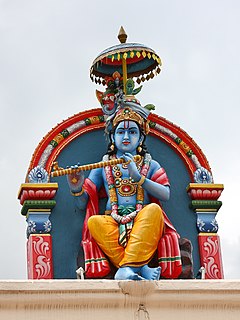 W
WKrishna is a major deity in Hinduism. He is worshipped as the eighth avatar of the god Vishnu and also as the supreme God in his own right. He is the god of compassion, tenderness, love and is one of the most popular and widely revered among Indian divinities. Krishna's birthday is celebrated every year by Hindus on Krishna Janmashtami according to the lunisolar Hindu calendar, which falls in late August or early September of the Gregorian calendar. Krishna is usually depicted with a flute in his hand.
 W
WLakshmana or Lakshana is seventh of the Ashtabharya, the eight principal queen-consorts of Hindu god Krishna, an avatar of the god Vishnu and the king of Dwarka - in the Dvapara Yuga (epoch).
 W
WMahabali, also known as Bali, Indrasenan or Māveli, is a Daitya king found in Hindu texts. Mahabali is the grandson of Prahlada, a descendant of Rishi Kashyapa. There are many versions of his legend in ancient texts such as the Shatapatha Brahmana, Ramayana, Mahabharata, and Puranas. His legend is a part of the annual Onam festival in the state of Kerala, and Balipratipada festival in the North India, Tulunadu and Karnataka. In Kerala tradition, Mahabali, the grandson of Prahlada who was a great devotee of Vishnu, is considered to be the noblest and prosperous king who transforms his kingdom into a land of heaven on earth, and who was given the greatest boon by Vishnu through his Vamana Avatar. Vishnu also gave him the boon that he will become Lord Indra in the next Mahayuga. He asked permission to visit the people of his kingdom on the harvest ceremony to see them live in happiness.
 W
WMitravinda is the sixth of the Ashtabharya, the eight principal queen-consorts of Hindu god Krishna, an avatar of the god Vishnu and the king of Dwarka - in the Dvapara Yuga (epoch).
 W
WMuchukunda, son of King Mandhata, and brother of equally illustrious Ambarisha, was born in the Ikshvaku dynasty. Ikshvaku dynasty is also known as Suryavansha. The important kings of this dynasty are Harishchandra, Dileepa, Raghu and Rama.
 W
WNagnajiti, also known as Satya, is the fifth of the Ashtabharya, the eight principal queen-consorts of Hindu god Krishna, an avatar of the god Vishnu and the king of Dwarka - in the Dvapara Yuga (epoch). She was the daughter of the King Nagnajita, of Kosala. Krishna competed in the svayamvara arranged by her father, and as per set rules he brought under control seven ferocious bulls by putting noose around each of them and thus won Nagnajiti as his wife.
 W
WNarada, or Narada Muni, is a god-sage, famous in Hindu traditions as a travelling musician and storyteller, who carries news and enlightening wisdom. He is one of mind-created children of Brahma, the creator. He appears in a number of Hindu texts, notably the Mahabharata, telling Yudhishtira the Prahlada story, the Ramayana as warning Ravan as well as in the Puranas. Once God decided that it was time for Him to descend to earth to set matters right, most lesser Gods came down too as someone or the other to aid and enjoy a ringside view of epochal events. He is also referred to as Rishiraj, meaning the king of all sages or rishis. He was gifted with the boon of knowledge, past, present and future.
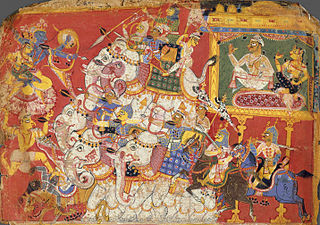 W
WNarakasura was a mythical asura king, the legendary progenitor of all three dynasties of Pragjyotisha-Kamarupa, and the founding ruler of the legendary Bhauma dynasty of Pragjyotisha. Though the myths about Naraka are first mentioned in the Mahabharata, later texts embellish them. According to later post-Vedic texts such as the Brahma Purana and Vishnu Purana, he was the son of Bhudevi, fathered either by the Varaha incarnation of Vishnu or Hiranyaksha. He is claimed as one who established Pragjyotisha. He was killed by Krishna and Satyabhama. His son Bhagadatta—of Mahabharata fame—succeeded him.
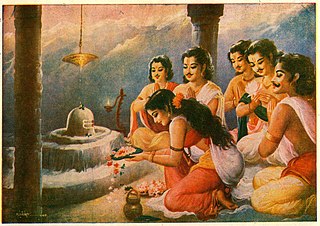 W
WThe Pandavas refers to the five brothers namely, Yudhishthira, Bhima, Arjuna, Nakula and Sahadeva, who are the main characters in the epic Mahabharata. They were the sons of Pandu, the king of Hastinapur and his two wives Kunti and Madri. The five brothers shared a wife, Draupadi. The Pandavas went to war with their cousins Kauravas; this was known as Mahabharata War.
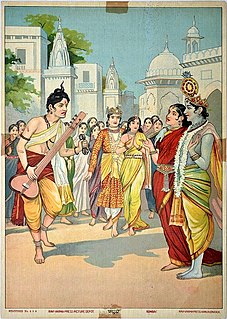 W
WPradyumna is the eldest son of the Hindu deities Krishna and Rukmini. Pradyumna is considered as one of the four vyuha avatars of Vishnu. According to the Bhagavata Purana, Pradyumna was an incarnation of Kamadeva, the god of love, previously burnt by Lord Shiva's anger.
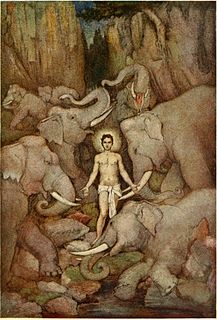 W
WPrahlada was a king, the son of Hiranyakashipu and Kayadhu, and the father of Virochana. He belonged to the Kashyapa gotra. He is described as a saintly boy from the Puranas known for his piety and bhakti to Vishnu. Despite the abusive nature of his father, Hiranyakashipu, he continued his devotion towards God Vishnu. He is considered to be a mahājana, or great devotee, by followers of Vaishnava traditions and is of special importance to devotees of Narasimha avatar. A treatise is accredited to him in the Bhagavata Purana in which Prahlāda describes the process of loving worship to Vishnu. The majority of stories in the Puranas are based on the activities of Prahlāda as a young boy, and he is usually depicted as such in paintings and illustrations.
 W
WPrithu is a sovereign (chakravartin), named in the Vedic scriptures of ancient India. According to Hindu mythology, he is an Avatar (incarnation) of the preserver god—Vishnu. He is also called Pruthu, Prithi and Prithu Vainya, literally, Prithu — the son of Vena. Prithu is "celebrated as the first consecrated king, from whom the earth received her (Sanskrit) name Prithvi." He is mainly associated with the legend of his chasing the earth goddess, Prithvi, who fled in the form of a cow and eventually agreed to yield her milk as the world's grain and vegetation. The epic Mahabharata and text Vishnu Purana describes him as a part Avatar (incarnation) of Vishnu. Capital of Prithu was Prayag.
 W
WRohini is a queen of Hindu god Krishna, who is an avatar of the god Vishnu and the king of Dwarka - in the Dvapara Yuga (epoch). She is mentioned as a queen in the Hindu epic Mahabharata, the Vishnu Purana, the Bhagavata Purana and the Harivamsa, an appendix of the Mahabharata. Krishna is described to have the eight principal queen-consorts, the Ashtabharya and 16,000 or 16,100 other wives; Rohini is described as one of the Ashtabharya or identified with the queen Jambavati in some lists and head of the other wives in a list.
 W
WIn Hinduism, Rohini is the first consort of Vasudeva and mother of the Hindu god Balarama and Subhadra. She played a prominent role in the nurture of Krishna.
 W
WRukmini or Rukmani is a Hindu goddess and the chief queen and eternal consort of Krishna, the king of Dwaraka and the avatar of the god Vishnu. She is described as the avatar of Lakshmi, the consort of Vishnu.
 W
WIn the Hindu scriptures like the Bhagavata Purana, Satrajit was a Yadava king who was a great devotee of Suryadeva, the Sun god. He is famous for his role in the story of Syamantaka gem. He was the son of Nighna, brother of Prasena and father of Satyabhama, who was Bhumidevi's incarnation and Sri Krishna's third wife.
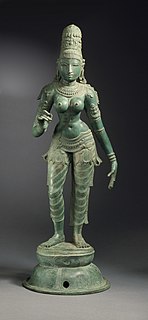 W
WSatyabhama, also known as, Satrajiti, is the third consort of the Hindu god Krishna, the eighth avatar of the god Vishnu. Satyabhama is described to be an avatar of Bhudevi, the Goddess of Earth. She aided Krishna in defeating the demon Narakasura.
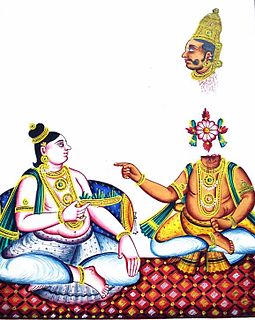 W
WShishupala was the son of Damaghosha after whom descendants to Chedi Kings were named as ghosis a tribe of Yadavas in Chedi, by Srutashrava, sister of Vasudeva, Kunti and cousin of Nanda Baba. He was slain by Krishna, his cousin and an avatar of Vishnu, at the great coronation ceremony of Yudhishthira in punishment for the opprobrious abuse made against his august personage. He was also called Chaidya, being a member of Chedi kingdom.
 W
WSubhadra is an important character in the epic Mahabharata and also appears in other ancient Hindu scriptures. In the epic, she is the sister of Krishna and Balarama, wife of Arjuna, mother of Abhimanyu and grandmother of Parikshit. She is the daughter of Vasudeva and his first wife Rohini. Subhadra is known as Veera sodari, Veera Patni and Veera mata due to her relationship with Krishna, Arjuna and Abhimanyu respectively. Subhadra is one of the three deities worshipped at the Jagannath temple at Puri, along with Krishna and Balarama. One of the chariots in the annual Ratha Yatra is dedicated to her.
 W
WSudama was a childhood friend of Hindu deity Krishna from Mathura, the story of whose visit to Dwaraka to meet Krishna is mentioned in the Bhagavata Purana. He was born as a poor man in order to enjoy the transcendental pastimes.
 W
W'Shuka is the son of the sage Vyasa and the main narrator of the Bhagavata Purana. Most of the Bhagavata Purana consists of Shuka reciting the story to the dying king Parikshit. Shuka is depicted as a sannyasi, renouncing the world in pursuit of moksha (liberation), which most narratives assert that he achieved.
 W
WUṣā or Usha was a daughter of the asura king Banasura and wife of Annirudha, grandson of Lord Krishna.
 W
WVishnu, is one of the principal deities of Hinduism. He is the supreme being within Vaishnavism, one of the major traditions within contemporary Hinduism.
 W
WVritra is a Vedic serpent, dragon or demon in Hinduism, the personification of drought and adversary of Indra. Vritra is identified as an Asura. Vritra was also known in the Vedas as Ahi. He appears as a dragon blocking the course of the rivers and is heroically slain by Indra.
 W
WVyasa is the traditional author of the Mahabharata, and Puranas, as well as the traditional compiler of the Vedas, some of the most important works in the Hindu tradition. He is also called Veda Vyāsa or Krishna Dvaipāyana.
 W
WIn Hindu legends, Yashoda, also spelt as Yasodha, is the foster-mother of Lord Krishna and wife of Nanda. She is described in the Puranic texts of Hinduism. According to Bhagavata Purana, Krishna was born to Devaki, but Krishna's father Vasudeva brought the newborn Krishna to Nanda Baba in Gokul, in order to raise and protect Krishna from Devaki's brother Kansa, the king of Mathura. The name Yashoda means 'one who is giver of Fame '.